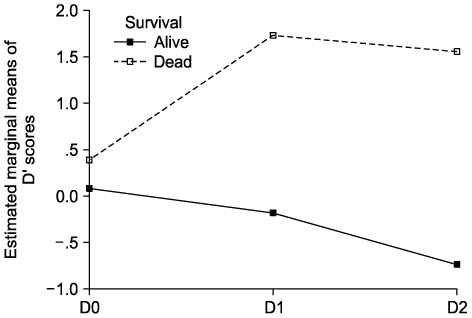J Korean Surg Soc.
2009 May;76(5):273-278. 10.4174/jkss.2009.76.5.273.
Usefulness of the Sequential Organ Failure Assessment (SOFA) Score in Patients with Sepsis due to Intra-abdominal Infection
- Affiliations
-
- 1Department of Surgery, Masan Samsung Hospital, Sungkyunkwan University School of Medicine, Masan, Korea.
- 2Department of Emergency Medicine, Masan Samsung Hospital, Sungkyunkwan University School of Medicine, Masan, Korea.
- 3Department of Surgery, Kyungpook National University Hospital, Kyungpook National University College of Medicine, Daegu, Korea. wyu@knu.ac.kr
- KMID: 2096546
- DOI: http://doi.org/10.4174/jkss.2009.76.5.273
Abstract
- PURPOSE
To determine the usefulness of the Sequential Organ Failure Assessment (SOFA) score for prediction of mortality in operated patients with sepsis due to intra-abdominal infection. METHODS: Eighty-eight septic patients operated on from January 2004 to June 2008 were evaluated retrospectively. The SOFA scores were measured four times in each patient: initial score, post-op (post-operation) score, POD1 (first post-operative day) score, and POD2 (second post-operative day) score. The maximum score and mean score were obtained from these measurements. These scores were compared between groups of patients classified by mortality. D scores (D0, D1, D2) reflecting the differences between subsequent scores were compared between the surviving group and deceased group according to re-operation. RESULTS: The initial, post-op, POD1, POD2, maximum, and mean scores showed statistically significant differences between the surviving group and deceased group. D1 and D2 showed statistically significant differences between surviving group and deceased group. CONCLUSION: The sequential measurement of SOFA score is a useful prediction system for patients with sepsis due to intra-abdominal infection.
Keyword
Figure
Cited by 1 articles
-
Combined hydrocortisone, ascorbic acid, and thiamine therapy for septic shock with complicated intraabdominal infection: before and after cohort study
Yong Oh Kim, Kee Sang Yoo, Kyoung Won Yoon, Hyo Jung Park, Chi-Min Park
Ann Surg Treat Res. 2021;100(6):356-363. doi: 10.4174/astr.2021.100.6.356.
Reference
-
1. Ho KM. Combining sequential organ failure assessment (SOFA) score with acute physiology and chronic health evaluation (APACHE) II score to predict hospital mortality of critically ill patients. Anaesth Intensive Care. 2007. 35:515–521.2. Vincent JL, Moreno R, Takala J, Willatts S, De Mendonca A, Bruining H, et al. The SOFA (Sepsis-related Organ Failure Assessment) score to describe organ dysfunction/failure. On behalf of the Working Group on Sepsis-Related Problems of the European Society of Intensive Care Medicine. Intensive Care Med. 1996. 22:707–710.3. Arts DG, de Keizer NF, Vroom MB, de Jonge E. Reliability and accuracy of Sequential Organ Failure Assessment (SOFA) scoring. Crit Care Med. 2005. 33:1988–1993.4. Ferreira FL, Bota DP, Bross A, Melot C, Vincent JL. Serial evaluation of the SOFA score to predict outcome in critically ill patients. JAMA. 2001. 286:1754–1758.5. Mullins RJ. Sabiston DC, Townsend CM, editors. Shock, electrolytes, and fluid. Sabiston Textbook of Surgery: The Biological Basis of Modern Surgical Practice. 2008. 18th ed. Philadelphia: Saunders;69–112.6. Anaya DA, Dellinger EP. Sabiston DC, Townsend CM, editors. Surgical infection and choice of antibiotics. Sabiston Textbook of Surgery: The Biological Basis of Modern Surgical Practice. 2008. 18th ed. Philadelphia: Saunders;299–327.7. Adams CA, Biffl WL, Cioffi WG. Sabiston DC, Townsend CM, editors. Surgical critical care. Sabiston Textbook of Surgery: The Biological Basis of Modern Surgical Practice. 2008. 18th ed. Philadelphia: Saunders;602–630.8. Marshall JC, Cook DJ, Christou NV, Bernard GR, Sprung CL, Sibbald WJ. Multiple organ dysfunction score: a reliable descriptor of a complex clinical outcome. Crit Care Med. 1995. 23:1638–1652.9. Moreno R, Vincent JL, Matos R, Mendonca A, Cantraine F, Thijs L, et al. The use of maximum SOFA score to quantify organ dysfunction/failure in intensive care. Results of a prospective, multicentre study. Working Group on Sepsis related Problems of the ESICM. Intensive Care Med. 1999. 25:686–696.10. Rivera-Fernandez R, Nap R, Vazquez-Mata G, Reis Miranda D. Analysis of physiologic alterations in intensive care unit patients and their relationship with mortality. J Crit Care. 2007. 22:120–128.11. Ho KM, Lee KY, Williams T, Finn J, Knuiman M, Webb SA. Comparison of Acute Physiology and Chronic Health Evaluation (APACHE) II score with organ failure scores to predict hospital mortality. Anaesthesia. 2007. 62:466–473.12. Khwannimit B. A comparison of three organ dysfunction scores: MODS, SOFA and LOD for predicting ICU mortality in critically ill patients. J Med Assoc Thai. 2007. 90:1074–1081.13. Peres Bota D, Melot C, Lopes Ferreira F, Nguyen Ba V, Vincent JL. The Multiple Organ Dysfunction Score (MODS) versus the Sequential Organ Failure Assessment (SOFA) score in outcome prediction. Intensive Care Med. 2002. 28:1619–1624.14. Pettila V, Pettila M, Sarna S, Voutilainen P, Takkunen O. Comparison of multiple organ dysfunction scores in the prediction of hospital mortality in the critically ill. Crit Care Med. 2002. 30:1705–1711.15. Ulvik A, Kvale R, Wentzel-Larsen T, Flaatten H. Multiple organ failure after trauma affects even long-term survival and functional status. Crit Care. 2007. 11:R95.
- Full Text Links
- Actions
-
Cited
- CITED
-
- Close
- Share
- Similar articles
-
- Liver Dysfunction in Sepsis
- Ability of a modified Sequential Organ Failure Assessment score to predict mortality among sepsis patients in a resource-limited setting
- Lactate Clearance as a Prognostic Factor of Organ Failure in Sepsis
- Circulating Biologically Active Adrenomedullin Predicts Organ Failure and Mortality in Sepsis
- Acute Physiology and Chronic Health Evaluation II Score and Sequential Organ Failure Assessment Score as Predictors for Severe Trauma Patients in the Intensive Care Unit



